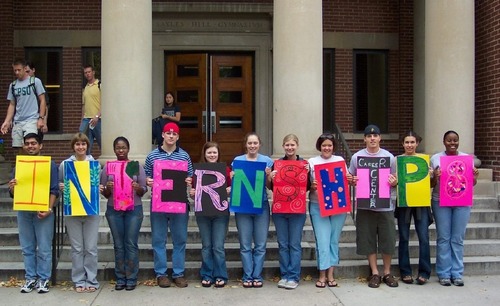
As summer nears, college seniors’ thoughts move past graduation and toward the job market. For many, that means internships(实习期). But before you take that leap(跳入) into the internship market, make sure you know what internships really can do for you—and what they can’t.
Myth #1: Anyone can be an intern
Although internship experience is commonly required for many white-collar professions, the harsh(严酷的) truth is that it’s a prerequisite(前提) many simply cannot afford. Without parental support many students and grads(graduates缩写,毕业生) struggle to makes ends meet(保持收支平衡) in expensive, internship-rich cities such as New York, Los Angeles, or Washington, D.C. Thus wealthy students with well-connected families are far more likely to end up as interns.
A 2010 study by the research firm Intern Bridge found that students from families earning more than $120,000 per year were more likely to get paid internships at for-profit companies than students with family income below $80,000, who were more heavily represented in unpaid positions. And while more internships are offered now than ever before (75 percent of college graduates complete an internship before graduation, compared with just 3 percent in the early 1980s), more of them are unpaid.
Myth #2: A summer internship is the same as a summer job
Summer jobs are done mainly for compensation(补偿金) and usually include entry-level(入门级) positions such as cashier(收银员), waitress, lifeguard(救生员), camp counselor, resort(度假地) worker, retail worker, or fast-food worker.
In contrast, internships should include some training along with direct supervision(监督管理) of the intern’s work. The purpose of an internship is to train someone for a particular job and to give that person an opportunity to gain relevant work experience in a career field.
Myth #3: Interns enjoy workplace protections
The courts do not consider unpaid interns to be employees, even if they have worked full time for a year in the same office as paid workers. Thus many interns are unable to claim basic workplace protections. Interns who have alleged sexual harassment in California, Oregon, Nebraska, Massachusetts and D.C. have had their cases dismissed, leaving them in legal limbo(中空地带).
Myth #4: You can’t include unpaid internships on a resume
All work experience related to a particular internship or job can be included on a resume. As a student, relevant coursework; extra-curricular(课外的) activities; community service; volunteer experience; and previous internships and/or jobs should all be detailed on your resume. Employers want to know if you possess the relevant skills and experiences, not how much you were compensated.
Myth #5: Internships lead to a fulltime job
Sadly, not always. Labor is expensive, which is why the troubled economy has created an internship boom. Many arts organizations, fashion houses, publishers, and media outlets take on dozens of interns without plans to hire any of them—or to help them get hired somewhere else.

